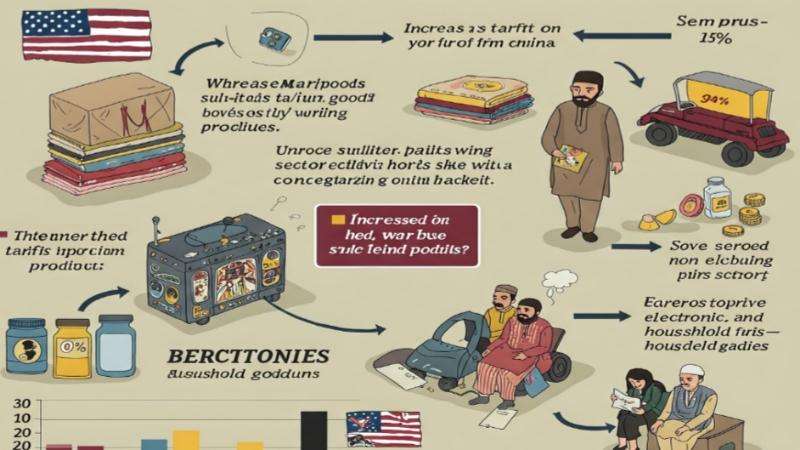President Donald Trump's "Liberation Day" trade war with China has escalated dramatically, triggering a tit-for-tat tariff battle that threatens to reshape global trade flows. China's retaliatory 34% tariffs on all US imports, effective April 10th, come in response to Trump's imposed 54% total tariffs on Chinese goods, a move Beijing denounces as "unilateral bullying." The consequences are poised to ripple through multiple sectors, with US farmers and tech giants facing significant disruption, Daily Dazzling Dawn understand.
The sheer imbalance of the US-China trade relationship—a $295 billion deficit in 2024—favors China's retaliatory power, according to experts like Dr. Xin Sun of King's College London. "The damage caused by China's retaliation to the US is due to be smaller than the impact of US tariffs on China," he asserts. However, this does not mean the US economy will be unscathed.
US agricultural exports, particularly soybeans ($15 billion in 2023), face severe headwinds. "China is a top buyer of its vegetable products ($20bn)," says Dr. Mary Lovely of the Peterson Institute for International Economics. “Most of all, the US agricultural sector will be worst hit by China’s tariffs.” This could alienate Trump's core political base, as agricultural states are crucial to his support.
Tech giants like Apple and Boeing, heavily reliant on Chinese markets, also face substantial risks. "This is going to impact companies like Apple and Caterpillar exports," warns Dr. Lovely. "We had settled into a new routine, and now that status quo was just completely upended by the tariffs from both sides." The US also exports significant volumes of machinery ($17 billion) and electronics ($12 billion) to China.
Conversely, American consumers will feel the pinch of the 54% tariffs on Chinese goods, particularly electronics ($208 billion in imports), textiles ($36 billion), and household appliances. The removal of tariff exemptions on low-value goods will likely drive up prices for popular brands like Shein and Temu.
The implications extend beyond the US and China. The UK, currently negotiating trade deals with both nations, faces potential disruptions in its supply chains. "The disengagement has been well underway. What we're seeing now is the next chapter in the process of decoupling between these geopolitical rivals," explains Simon Evenett, Professor of Geopolitics and Strategy at the International Institute for Management Development. Increased costs and potential trade barriers could impact British businesses and consumers.
For Bangladesh, heavily reliant on textile exports, the trade war could have mixed implications. While increased US tariffs on Chinese textiles might create opportunities for Bangladeshi manufacturers, disruptions in global supply chains and potential economic slowdowns could negatively affect overall demand. The situation also presents a risk to the Bangladeshi economy, that relies on remittances from overseas workers, and a global economic downturn would likely reduce those remittances.
The long-term consequences of this trade war remain uncertain. "This actually reduces the prospects for companies like Boeing," says Dr. Lovely, highlighting the potential for lasting damage. The coming months will be crucial in determining the extent of the economic fallout and the potential for a negotiated resolution.
Trump's Trade War: Ripple Effects on British Muslims and South Asians
The Trump administration's trade war with China has had a ripple effect on communities across the globe, including British Muslims, South Asians also British Bangladeshi. As a significant portion of this community relies on imports from China, particularly in sectors like textiles, electronics, and household goods, the increased tariffs have led to higher prices for essential items. This has disproportionately impacted low-income families within these communities, many of whom rely on affordable goods for their daily needs. Moreover, the trade war has created uncertainty in global supply chains, potentially impacting businesses owned by British Muslims and South Asians, particularly those involved in import-export or manufacturing sectors. The potential for economic slowdowns in major economies due to the trade war could also lead to job losses and reduced remittances from overseas workers, further affecting the financial stability of these communities.








.svg)


